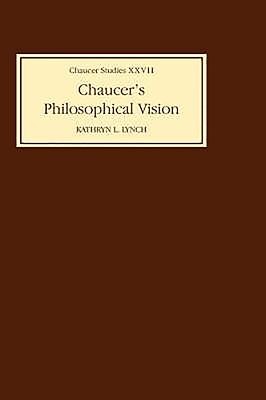
- We will send in 10–14 business days.
- Author: Kathryn L Lynch
- Publisher: Boydell & Brewer
- ISBN-10: 0859916006
- ISBN-13: 9780859916004
- Format: 15.6 x 23.4 x 1.3 cm, hardcover
- Language: English
- SAVE -10% with code: EXTRA
Reviews
Description
New readings of Chaucer's dream visions, demonstrating his philosophical interests and learning.
Chaucer's Philosophical Visions dramatically extends our sense of the fourteenth-century poet's philosophical interests and learning.Arguing that Chaucer was well acquainted with late medieval English Scholasticism, this book offers new readings of four of his earliest major poems, the dream visions: the Book of the Duchess, the House of Fame, the Parliament of Fowls, and the Prologue to the Legend of Good Women. By resituating these poems within the genre of the 'philosophical vision' (epitomized by Boethius's Consolation of Philosophy), these readings demonstrate Chaucer's interest in metaphysics, epistemology, and logic. Indeed, the only intellectual idiom available to Chaucer for exploring the way that the human mind works and the way that words work to express human reality was philosophical language, a language that Chaucer employed with the same technical acumen that he brought to other contemporary learned traditions, like astronomy and natural science.KATHRYN L. LYNCH is the Katharine Lee Bates and Sophie Chantal Hart Professor of English at Wellesley College, Massachusetts.
EXTRA 10 % discount with code: EXTRA
The promotion ends in 18d.13:20:24
The discount code is valid when purchasing from 10 €. Discounts do not stack.
- Author: Kathryn L Lynch
- Publisher: Boydell & Brewer
- ISBN-10: 0859916006
- ISBN-13: 9780859916004
- Format: 15.6 x 23.4 x 1.3 cm, hardcover
- Language: English English
New readings of Chaucer's dream visions, demonstrating his philosophical interests and learning.
Chaucer's Philosophical Visions dramatically extends our sense of the fourteenth-century poet's philosophical interests and learning.Arguing that Chaucer was well acquainted with late medieval English Scholasticism, this book offers new readings of four of his earliest major poems, the dream visions: the Book of the Duchess, the House of Fame, the Parliament of Fowls, and the Prologue to the Legend of Good Women. By resituating these poems within the genre of the 'philosophical vision' (epitomized by Boethius's Consolation of Philosophy), these readings demonstrate Chaucer's interest in metaphysics, epistemology, and logic. Indeed, the only intellectual idiom available to Chaucer for exploring the way that the human mind works and the way that words work to express human reality was philosophical language, a language that Chaucer employed with the same technical acumen that he brought to other contemporary learned traditions, like astronomy and natural science.KATHRYN L. LYNCH is the Katharine Lee Bates and Sophie Chantal Hart Professor of English at Wellesley College, Massachusetts.


Reviews